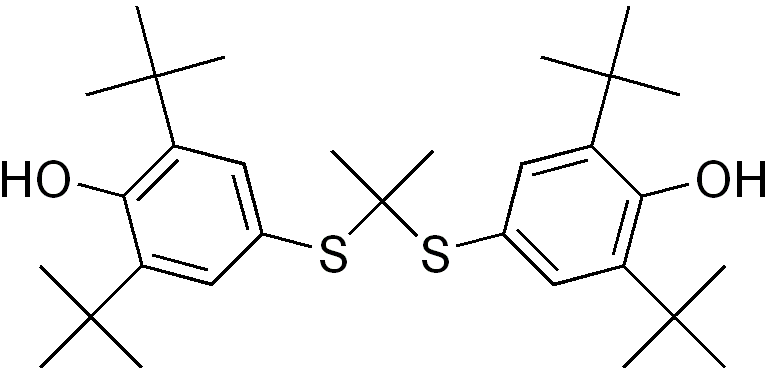Probucol
 | |
| Clinical data | |
|---|---|
| ATC code | |
| Identifiers | |
| |
| PubChem CID | |
| E number | {{#property:P628}} |
| ECHA InfoCard | {{#property:P2566}}Lua error in Module:EditAtWikidata at line 36: attempt to index field 'wikibase' (a nil value). |
| Chemical and physical data | |
| Formula | C31H48O2S2 |
| Molar mass | 516.844 g/mol |
|
WikiDoc Resources for Probucol |
|
Articles |
|---|
|
Most recent articles on Probucol |
|
Media |
|
Evidence Based Medicine |
|
Clinical Trials |
|
Ongoing Trials on Probucol at Clinical Trials.gov Clinical Trials on Probucol at Google
|
|
Guidelines / Policies / Govt |
|
US National Guidelines Clearinghouse on Probucol
|
|
Books |
|
News |
|
Commentary |
|
Definitions |
|
Patient Resources / Community |
|
Directions to Hospitals Treating Probucol Risk calculators and risk factors for Probucol
|
|
Healthcare Provider Resources |
|
Causes & Risk Factors for Probucol |
|
Continuing Medical Education (CME) |
|
International |
|
|
|
Business |
|
Experimental / Informatics |
Editor-In-Chief: C. Michael Gibson, M.S., M.D. [2]
Overview
Probucol is an anti-hyperlipidemic drug[1] initially developed in the treatment of coronary artery disease.
However, clinical trials were stopped after it was found that it may lower HDL in patients with a previous history of heart disease.
Probucol was initially developed in the 1970s by a chemical company to maximize airplane tire longevity.
Probucol is associated with QT interval prolongation.
Mechanism
Probucol lowers the level of cholesterol in the bloodstream by increasing the rate of LDL catabolism. Additionally, probucol may inhibit cholesterol synthesis and delay cholesterol absorption.[2] Probucol is a powerful antioxidant which inhibits the oxidation of cholesterol in LDLs; this slows the formation of foam cells, which contribute to atherosclerotic plaques.
It is believed to act at ABCA1.[3]
It also lowers levels of HDL.[4]
References
- ↑ Yamamoto A (December 2008). "A Uniqe Antilipidemic Drug - Probucol". J. Atheroscler. Thromb. 15 (6): 304–5. doi:10.5551/jat.E621. PMID 19075491.
- ↑ "Probucol. Drugs.com web site. [1]
- ↑ Favari E, Zanotti I, Zimetti F, Ronda N, Bernini F, Rothblat GH (December 2004). "Probucol inhibits ABCA1-mediated cellular lipid efflux". Arterioscler. Thromb. Vasc. Biol. 24 (12): 2345–50. doi:10.1161/01.ATV.0000148706.15947.8a. PMID 15514211.
- ↑ Miida T, Seino U, Miyazaki O; et al. (October 2008). "Probucol markedly reduces HDL phospholipids and elevated prebeta1-HDL without delayed conversion into alpha-migrating HDL: putative role of angiopoietin-like protein 3 in probucol-induced HDL remodeling". Atherosclerosis. 200 (2): 329–35. doi:10.1016/j.atherosclerosis.2007.12.031. PMID 18279878.
- Pages with script errors
- CS1 maint: Multiple names: authors list
- CS1 maint: Explicit use of et al.
- E number from Wikidata
- ECHA InfoCard ID from Wikidata
- Chemical articles without CAS registry number
- Articles without EBI source
- Chemical pages without ChemSpiderID
- Chemical pages without DrugBank identifier
- Articles without KEGG source
- Articles without InChI source
- Articles without UNII source
- Drugs with no legal status
- Articles containing unverified chemical infoboxes
- Drug
- Cardiovascular Drugs
- Hypolipidemic agents